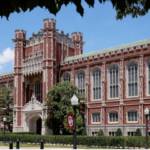‘They Left the Vivid Air Signed with Their Honor’
There’s a famous photograph of Gen. Dwight D. Eisenhower talking with the men of the 101st Airborne Division in the hours before D-Day. Eisenhower had already set in motion the vast machinery of the greatest invasion in history — issuing hundreds of orders that would send tens of thousands of men and a vast armada of ships hurtling toward the coast of France.
To this day, there is uncertainty about what the “D” in D-Day stands for. For Eisenhower, who had had to decide whether to postpone the scheduled departure of the invasion fleet because of violent storms battering England from the North Atlantic, the “D” would doubtless mean Decision. After a delay of 24 hours, Ike was offered a momentary break in the weather. He seized it. Ike said simply: “OK. Let’s go.” He was the decider.
Dwight David Eisenhower, the son of devout Christian parents from Kansas, did not hesitate to call this great invasion the Crusade in Europe. He coined that phrase and used it to title his war memoirs. Sophisticates during his popular two-term presidency liked to ridicule Ike’s syntax, but the five-star General’s elegantly written memoirs have never been out of print.
Ike would never have claimed the laurels of victory for himself. He would always give the credit to those men who put their lives on the line that chilly June morning in 1944. Thousands of them left their life’s blood on the sands of Utah and Omaha beaches. The code names for the American landing beaches are preserved yet in Normandy. So are those of the British (Gold and Sword) and Canadian (Juno) landing areas.
Eisenhower — as Supreme Commander of the Allied Expeditionary Force (SCAEF) — gave the orders that would send 2,499 young Americans and 1914 soldiers from Allied nations to their deaths. Ike was keenly aware of their sacrifices. Throughout his life, he never sought to claim the honor that was theirs.
When, sixty years ago in 1954, as President of the United States, Eisenhower might have used the tenth anniversary of D-Day for political gain at home, he spent the day instead with his beloved family at Camp David.(Camp David is the name Ike gave to the rustic presidential retreat in the Catoctin Mountains of Maryland. He named it for his grandson, David.) “Humility must always be the portion of any man who receives acclaim earned in the blood of his followers and the sacrifices of his friends.” That’s how General of the Armies Dwight D. Eisenhower spoke of the Allied triumph when he addressed London’s Guild Hall in June, 1945. By then, the whole world acknowledged him as the architect of victory in that Crusade.
In our own time, this month of June is celebrated by some as a month of pride. But humility was the portion of Dwight D. Eisenhower. And it was the practice of Ronald Reagan. When President Reagan went to Normandy in 1984 to commemorate the 40th anniversary of D-Day, he was the first U.S. Commander-in-Chief to mark the occasion. On the windswept cliffs of Pointe-du-Hoc, Reagan paid tribute to “the Boys of Pointe-du-Hoc.”
“These are the boys of Pointe du Hoc. These are the men who took the cliffs. These are the champions who helped free a continent. These are the heroes who helped end a war.”
Reagan directed the attention of the world not to himself or his own life’s experience, but to their sacrifices, theirstruggle, their victory, and their cause. Theirs was the cause of freedom. Reagan quoted poet Stephen Spender saying: “You left the vivid air signed with your honor.”
There is some confusion today about what it means to serve this country with honor and to how to wear the uniform with distinction. There was no confusion then. Eisenhower and Reagan taught us all what those words mean. Their leadership shows us that each generation must learn again how to live with humility and how to serve others honorably.
Bob Morrison is a Senior Fellow at the Family Research Council and the original piece can be viewed here.





